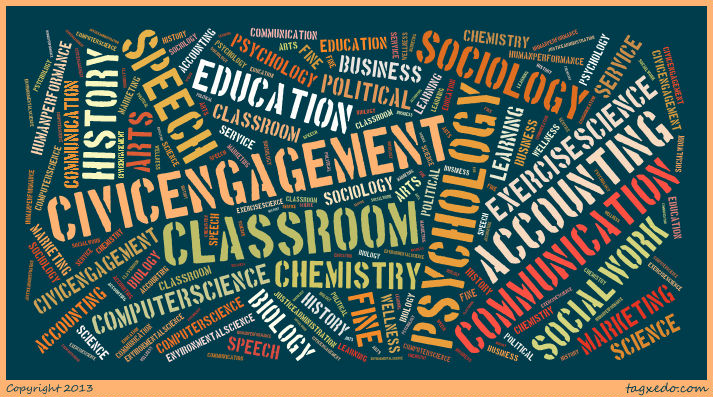Civic Engagement in the Classroom

Civic Engagement in the Classroom
Civic engagement may be incorporated into the classroom in a number of ways. For example, SMSU faculty have made use of NY Times as the main "text" for a course, involved students in direct service (i.e., service learning), involved students in area advisory boards, encouraged students to write letters to editors of local papers, incorporated involvement in electoral processes into course instruction, or created learning opportunities for some combination of all of these forms of civic engagement. Below you will find some examples "civic engagement in the classroom" over the past few years.
Dr. Tom Williford - HISTORY - Students subscribe to The New York Times at a discounted rate through SMSU's participation in the NY Times inCOLLEGE Program and bring their newspapers to class to discuss contemporary global issues (to learn more about the NY Times inCollege Program go to http://www.nytimesincollege.com/ ).
Dr. Will Thomas -ACCOUNTING- Students serve on local boards.
Dr. David Sturrock - POLITICAL SCIENCE - Students conduct exit polls during election years.
Dr. Emily Deaver - ENVIRONMENTAL SCIENCE - SMSU students work collaboratively with Marshall High School students to gather data related to water quality/ecosystem status of the Redwood River through the now multi-year Redwood River Monitoring Project.
Dr. Scott Peterson - PSYCHOLOGY - Students enrolled in a Developmental Psychology may opt to volunteer area sites for 20 hours as a means of adding depth to their understanding of developmental constructs, while addressing area needs.
Dr. Kerry Livingston - SOCIOLOGY - Students enrolled in an online Social Problems course may opt to locate service opportunities in the Marshall area or broader SW Minnesota region as a means of increasing their understanding of factors that contribute to a variety of social problems covered in this course.
Dr. Christine Olson - PSYCHOLOGY - Students enrolled in General Psychology and Psychology Seminar could, for extra credit, become involved in 15-20 hours of Election 2012 processes (e.g., assisting with voter registration, canvassing, assisting with coordination of public forums for local candidates) as a means of gaining a better understanding "efficacy/motivation for social change".
Dr. Rick Herder, Dr. Christine Olson, and Dr. Will Thomas - CONTEMPORARY ISSUES --All of these faculty include consideration of various forms of civic engagement to address social problems such as human trafficking, addressing the needs of single-parent households in the area, assisting with prevention of irresponsible driving, and addressing the needs of new immigrant members of Marshall area communities (to name a few).
Civic Engagement in the Classroom Form
Civic Engagement in the Classroom
| COURSE | FACULTY |
ACADEMIC DISCIPLINE | DESCRIPTION |
|---|---|---|---|
|
ENVS 115 Redwood River Monitoring |
Dr. Emily Deaver, | ENVIRONMENTAL SCIENCE | |
|
IDST 400 Confronting Human Trafficking |
Dr. Rick Herder | SPEECH/COMMUNICATION | |
|
IDST 400 Self as Citizen |
Dr. Christine Olson | PSYCHOLOGY | |
|
SOCI 220 Social Problems |
Dr. Kerry Livingston | SOCIOLOGY | |
|
PSYC 340 Developmental Psychology |
Dr. Scott Peterson | PSYCHOLOGY | |
|
SWRK 234 Intro to Social Work |
Dr.Rick Robinson | SOCIAL WORK | |
| Dr. David Sturrock | POLITICAL SCIENCE | ||
| Kris Cleveland | EXERCISE SCIENCE | ||
| Dr. Will Thomas | ACCOUNTING | ||
|
HIST 210 Contemporary Modern History |
Dr. Tom Williford | HISTORY |
Last Modified: 11/2/22 2:45 PM | Website Feedback


